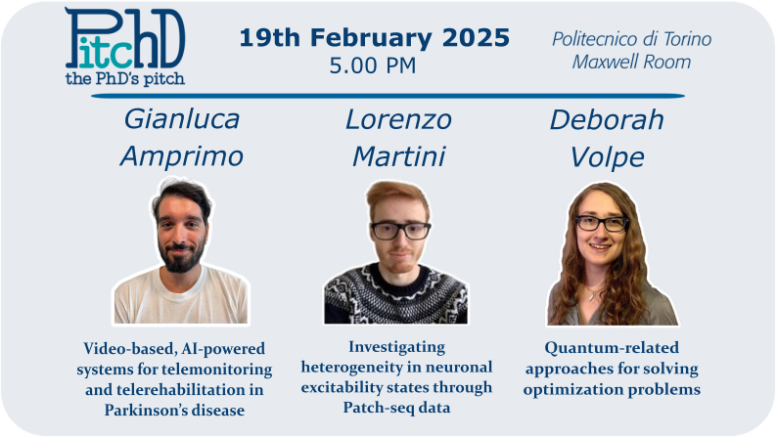19th February 2025 – 5.00 PM
Politecnico di Torino – Maxwell Room
Here’s the 1st PitchD – the PhD’s pitch. Our PhD IEEE Student Members explain to students, colleagues and professors their research in-presence.
Video-based, AI-powered systems for telemonitoring and telerehabilitation in Parkinson’s disease
Mr. Gianluca Amprimo
Dept. of Automation and Computer Engineering, Politecnico di Torino
Abstract: Recent advances in the field of deep learning have paved the way for exciting new possibilities in the monitoring and automatic staging of the motor condition of patients affected by Parkinson’s disease. By introducing cutting-edge deep learning models for human pose estimation from RGB-Depth and RGB videos, we can leverage videocameras and deep learning to identify the disease, monitor its progression, and track daily symptoms fluctuation directly at the patient’s home. This provides clinicians with a deeper understanding of their patients’ health condition, reducing the need for frequent in-person examinations.
Biography: Gianluca Amprimo received his Master’s Degree in Computer Engineering from Politecnico di Torino in 2020. He is currently a PhD student at the Control and Computer Engineering Dept. of Politecnico di Torino and junior researcher at the Italian National Research Council (CNR-IEIIT). He collaborates also with the Dept. of Neurosciences of Molinette Hospital (Turin), Istituto Auxologico Italiano (San Giuseppe Hospital, Verbania) and Associazione Amici Parkinsoniani Piemonte Onlus. His main research interests include human pose estimation, innovative technologies for telemonitoring and telerehabilitation, AI for medical applications.
Investigating heterogeneity in neuronal excitability states through Patch-seq data
Mr. Lorenzo Martini
Dept. of Automation and Computer Engineering, Politecnico di Torino
Abstract: The mammalian brain cortex shows an incredible heterogeneity in its neuron population. Those many different neuron types and how they interact with each other are fundamental for the neural networks that form the intricate high-level cognitive functions. Neurons differentiate themself not only by genomic level differences but also by their dynamic activation pattern and response to stimuli, often referred to as excitability state. In our work, we explore the heterogeneity of neuronal excitability states across diverse cell types using the powerful Patch-seq technique, which combines patch-clamp electrophysiology, single-cell RNA sequencing, and morphology. This integrative approach allows us to correlate electrophysiological profiles with molecular signatures, providing new insights into how excitability varies within and across neuronal populations. Our analysis focuses on the sub-class of inhibitory neurons and highlights key molecular pathways associated with distinct excitability states and their impact on electrophysiological properties.
Biography: Lorenzo Martini, a Ph.D. Candidate specializing in Computer and Control Engineering at Politecnico di Torino’s Department of Control and Computer Engineering, focuses his work on Bioinformatics and Computational Biology research. The main research interests include cellular heterogeneity, transcriptional regulation, and neuronal investigation
Quantum-related approaches for solving optimization problems
Ms. Deborah Volpe
Dept. of Electronics and Telecommunication Engineering (DET), Politecnico di Torino
Abstract: Solving optimization problems with quantum computing requires addressing multiple degrees of freedom and abstraction levels. This research explores quantum-related optimization problem solving from various perspectives, including the improvement of existing solvers, the design of quantum-inspired algorithms, and the development of quantum-based approaches for real-world challenges. A key focus is on refining the translation of classical optimization problems into quantum-compatible formulations, streamlining the efficient use of both quantum and quantum-inspired solvers. Additionally, efforts are directed toward evaluating computational paradigms to determine the most suitable solver for specific problem classes. Comparative analyses validate these methodologies against the state of the art, demonstrating their potential to enhance solution quality, scalability, and applicability across diverse domains.
Biography: Deborah Volpe received her B.Sc. and M.Sc. degrees in Electronic Engineering from Politecnico di Torino in 2019 and 2021, respectively. She is currently pursuing a Ph.D. in Electrical, Electronics, and Communications Engineering at the same institution and was a visiting researcher at the Chair for Design Automation at the Technical University of Munich between 2023 and 2024. Her research focuses on quantum-compliant approaches for solving QUBO problems and emulation of quantum computers on classical hardware.


Be the first to comment on "PitchD 2025 edition – the 1st PitchD"